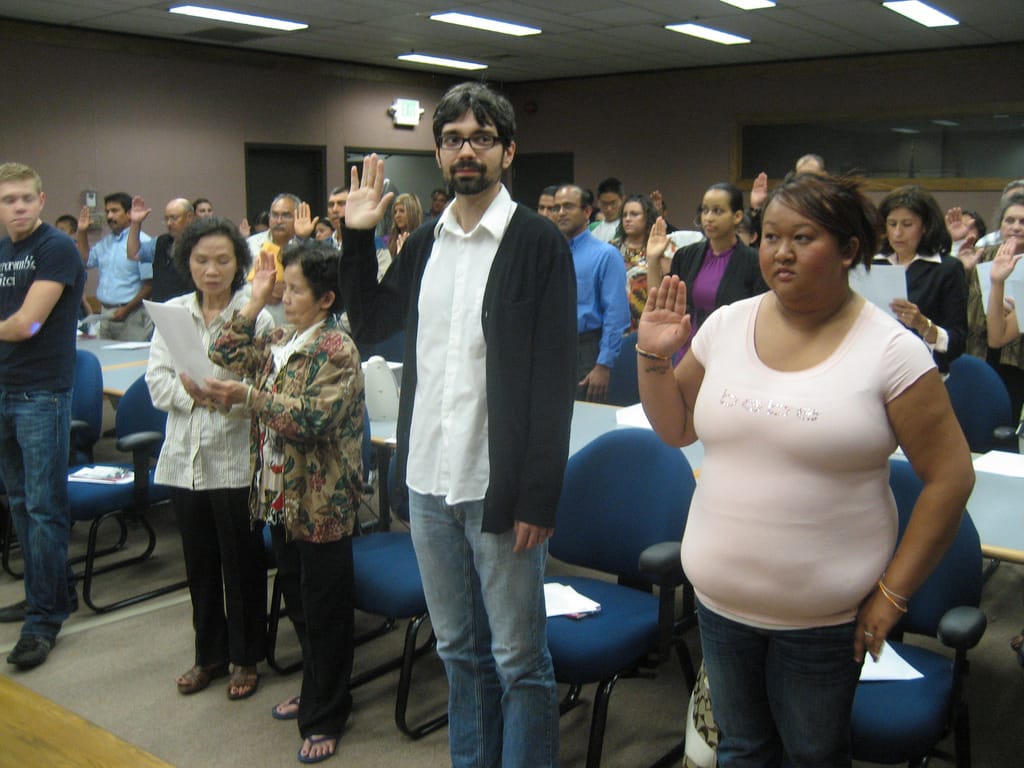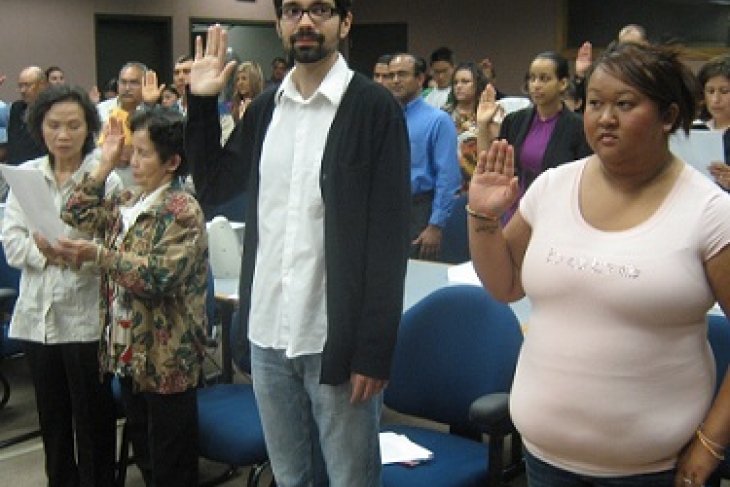
Arizona last week became the first state to make passing the U.S. Citizenship Test a high school graduation requirement. Governor Doug Ducey signed into law a bill mandating the test after the measure passed the state’s Republican-controlled House and Senate in a single day. And that’s really about all the deliberation that should be needed for other states to follow Arizona’s lead. It’s a no-brainer in more ways than one.
Here are some of the questions on the test:
- What are the first ten amendments to the Constitution called?
- Name two rights in the Declaration of Independence.
- Why do some states have more representatives than others?
- Who is the governor of your state now?
- How old do citizens have to be to vote for President?
- Who is the President of the United States?
These are among 100 basic questions on American government and history published by the U.S. Immigration and Naturalization service. It’s not particularly challenging stuff. Those seeking citizenship are asked up to ten of the questions; six correct is a passing score. Arizona students will need to get sixty of the hundred questions correct in order to graduate—the same ratio as immigrants to our country seeking citizenship.
It’s curious to note that the federal government—by law and tradition, and quite correctly—makes no curricular demands on its schools or knowledge demands on its native-born sons and daughters. But if you’re born elsewhere and wish to be naturalized, we do insist on a minimal baseline of factual knowledge before we confer upon you the title of citizen.
Here’s how hard the test is not: In 2010, the pass rate among those seeking naturalization was 97.5 percent according to a Xavier University study. Yet more than one in three native-born citizens fail when asked to show even that rock-bottom, basic level of civic knowledge. Raise the bar to seven out of ten for a passing and 50 percent fail. That’s an embarrassment, even humiliating. It’s also incongruous to make knowledge demands, however trivial, of one class of citizens but not another. Arizona, to its credit, is closing this gap.
Serious People in Education cluck at the citizenship test. It’s just trivial pursuit, they say. It’s no substitute for deep engagement in civics and citizenship. In an age where parents are rightly concerned about overtesting, do we really need yet another test to stress kids out? Perhaps not, but this one’s about as rigorous as the written test you took to get your learner’s permit at the Department of Motor Vehicles. If you graduate from a U.S. high school without being able to name one of your senators, any war fought in the 1900s, or the name of a single American Indian tribe, something has gone seriously wrong. Let’s not pretend otherwise.
To be sure, some questions on the citizenship test are trivia. No one should confuse the ability to cite obscure facts like the three authors of Federalist Papers or the precise number of amendments to the U.S. Constitution with a rigorous education in civics and history. But there is power in signaling an expectation, however modest, that there is a knowledge base common to all Americans and a baseline threshold below which no one should slip. It’s simply not a Herculean undertaking to familiarize yourself with a handful of elementary-school-level facts about the country whose schools have handed you a high school diploma.
Indeed a few years ago, a New Zealand-born elementary school teacher at a TeamCFA charter school in North Carolina was herself studying to take the citizenship test. She figured out that the answers to most of the hundred questions were in her school’s Core Knowledge curriculum. The solons of Arizona have basically mandated a fourth-grade education.
The simple—even simplistic—nature of the citizenship test isn’t a problem: It’s a benefit. Tired of the audacious “moonshot” goals we set for our schools? Me too. Overpromise and under-deliver enough and cynicism inevitably sets in. American education could sorely use a proof point that we can still get things done. Getting nearly all children to clear the low bar of the citizenship test is a worthy bid.
Our two goals— a deep engagement in public affairs and a minimal factual knowledge of civics and history—are not mutually exclusive. When I’m not at Fordham, I teach a seminar in civics and citizenship to twelfth graders at Democracy Prep, a New York City charter school that consciously (some might say aggressively) tries to inculcate a sense of civic duty and a spirit of activism. On January 30, every one of my students will take a short break from the current unit on examining police procedures and “broken windows” theory to take the citizenship test. It’s been a graduation requirement since the school was founded—and 60 percent isn’t the standard, but 83 percent. I’m not worried about it, and neither are my students. It’s not too hard. And it’s not too much to ask.
Without a doubt, we have bigger fish to fry in American education. Let’s start with the small fry. Kudos to Arizona for insisting all its children meet this barest minimum standard.
photo credit: Neven Mrgan via Flickr

